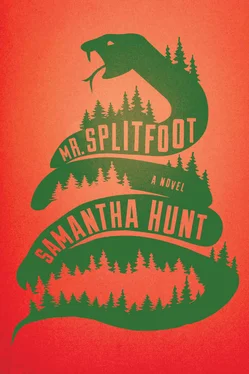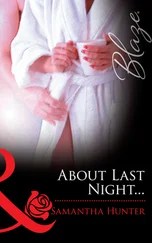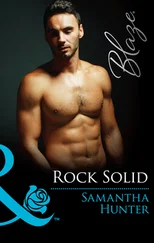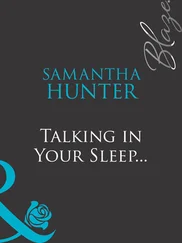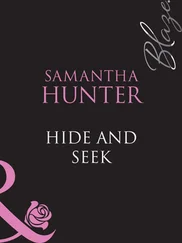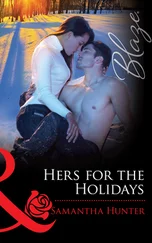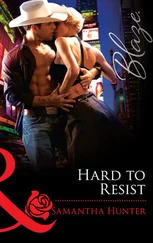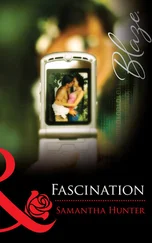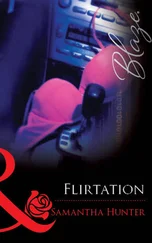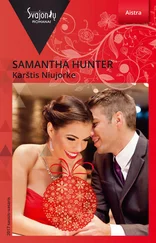I look into the woods. “A meteor made this?”
“Not a meteor,” says Alex. “It’s a sinkhole.” He’s matter-of-fact. “Our town is getting swallowed because the gas company’s sucking everything out from underneath us. That’s the real reason they closed our school. They’re getting ready to kick everyone out of town so they can get the gas.”
“That’s not it,” Charley says.
“Then, what is it?”
“I don’t know. I’m just a kid.” Charley starts up the sound again, and the rest of us join in. There isn’t any point to it. I’m not getting anywhere. No start, middle, or end. The children scream and I scream, and the noise we make goes out and down and round and round and round.
That night it starts to rain, drenching. My bones ache. They are damp. Hot baths march across my mind, warm beds. Ruth and I break into a basement window of the school. It hasn’t been closed up for long. Artwork hanging in the hallway still has its color. The freezer in the cafeteria’s kitchen is plugged in, stocked with small square pizzas and garbage bags of frozen corn.
There are two vinyl chaises in the infirmary. We stretch out, but it’s creepy sleeping in the sickroom. “Come on.”
The library is like a dollhouse. Everything built for half-size people. The books are still on the shelves. We settle into Story Corner. It says so in construction paper cutouts above our heads. A pile of pillows, soft pads, and blankets. In the streetlight I read The Owl and the Pussycat. I read In the Night Kitchen, holding the pages open so Ruth can see each illustration. She hands me the next book. I crack its spine and begin. “‘We were tired of living in a house.’”
That night I dream I’m a pack mule.
When we wake, I make pretend at the librarian’s desk, surrounded by office supplies. Stamp pads, pencil sharpeners, envelopes in all sizes, string, and a rubber thimble for turning pages, accessories of usefulness. I set the due date stamp, giving myself a little bit longer than I think I actually have. I press its blue ink onto my belly.
Ruth reorganizes her backpack, dumping all its contents out onto a child-size table. She folds and sniffs things. She pulls out a simple-looking book she’s been carrying. “What’s that?”
She turns the cover toward me. It’s primitive looking, like some early American religious text. The Book of Ether, it says, stamped in gold.
“What’s it about?”
She passes me the book, and I carry it over to the window to see better.
298
Hide up the records in the earth,
hide up the records which were sacred, the
records played only if there are advanced
spacefaring civilizations in interstellar space
hide up the records,
hide in the wilderness,
hide in the dust
and hidden things shall come to light.
When I see him outside the school in his leather coat and sunglasses, I welcome the experience of familiarity. But then I see Ruth’s face. Her eyes follow every step he takes. I close the book. She watches him rattle the chains of the padlock, bang his cane against the doors, as if we are the last nuts in a jar he’ll shake until we fall into his hardened hand.
This whole time we’ve been walking, I thought we were heading somewhere, but just now, seeing her scared face, I know that we’re also running away.
Ruth shoves me back from the window. She takes my arm roughly. Still clutching her book in my hand, I grab my things. We exit through the boiler room transom. We run through the playground, through the soccer fields. We run into the town where people live and people buy groceries and people do many normal, regular things, but even then, among these normal people, Ruth does not want to stop running.

THE FOOD IN THE KITCHENbelongs to old people: saltines, sherbet, cling peaches. The chrome canisters for flour, sugar, and coffee are pocked by rust.
“Hello?”
Mr. Bell had asked them to meet here, had given them the address and apologized. “I’ve an appointment and won’t be able to fetch you.”
Ruth had spent the night wondering what sort of appointment Mr. Bell might have to keep. Who are his friends, his associates? What are they associating over? She’d thought Mr. Bell was theirs alone, that she and Nat had conjured him, had asked for him to appear one night in a dark basement. Now it seems that’s not true. Other girls can see Mr. Bell, talk to him, eat food with him, lie naked beside him in bed, say, should anyone want to do something like that.
Nat and Ruth set out after dinner. The Father has already disappeared behind his locked door. The air outside is perfectly cool. Some leaves have fallen. They walk to the address Mr. Bell provided, a small house in a solid block of other wooden homes, one in a line of aged identical sisters, each clothed in a different shade of chipped paint. Ruth knocks. There’s no answer. Muslin curtains obscure the first floor. She opens the door a sliver, letting it hang that way. “Hello?” She sends the question through the narrow opening. A car engine turns over across the street. She pushes the door open a bit more. “Mr. Bell? Are you here?” Nat steps inside.
From the foyer they see a living room wallpapered in gold. Two straight-backed yellow couches, a low table, two Windsor chairs, one empty bookshelf. The hallway, papered in red flowers above the wainscoting, leads to the kitchen behind the stairs.
“Mr. Bell?” Nat heads to the back of the house, leaving the second floor for Ruth to search. A painted glass pendulum lamp hangs overhead. “Mr. Bell?” She climbs three-quarters of the way up, her head above the second-story landing. She moves slowly. “Hello?” The railing, the floors, the dark wood trim work. Each of the four doors off the upstairs hall bears an etched brass door plate. Each door is closed. A framed print hangs in the hall, Irishmen and Africans building the Erie Canal. Someone’s once-tidy home.
“Mr. Bell.” She gains the landing. “Are you here?”
Ruth walks with hands in front of her body, palms turned sideways prepared to karate chop whatever may strike. She opens the first door. A plain bathroom. Small white hex tiles on the floor. A basin stained blue by the metallic drip. There’s a clawfoot tub with a white plastic curtain. Ruth backs out of the room.
She tries the next door, no longer calling for Mr. Bell. Her throat’s gone dry. The room is empty but for a set of mauve polyester curtains and a crank-operated hospital bed dressed in a filthy sheet. Ruth retreats swiftly, her breath coming faster.
The next room is slightly less empty. There’s a single bed with a painted pine headboard, no sheets, no blankets. There’s a night table, and on the table there’s a lamp whose stem is a ceramic ballerina in a blue tutu. The ballerina holds a bare bulb in her lifted hand. A large round mirror hangs on one wall, and on the floor below the mirror there’s a packed canvas army surplus duffle.
Ruth kneels to inspect the luggage. Her knees pop as she bends. The sound alarms her. She holds her breath and digs carefully, making as little noise as possible. A number of white tank-top undershirts. A wrinkled overcoat. She covers the trove with both hands. It’s Mr. Bell’s stuff. She’s found his lair. Ruth continues to dig. She unpacks a stack of three books, one mystery, one field guide to North American trees, and a novel, Delta of Venus. Ruth opens to a bookmarked page and begins to read. Two naked ladies and a horsewhip. It’s a dirty book. “They reached the full effulgence of their pleasure.” Even Mr. Bell’s pornography uses funny words. Ruth keeps digging, touching his things. Mr. Bell’s toiletry sack. A Bustelo coffee canister half filled with grounds and a red plastic scoop. Each thing she touches makes him more real. Ruth looks behind her. No one there.
Читать дальше
